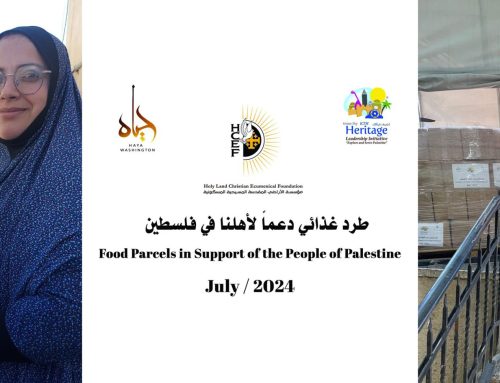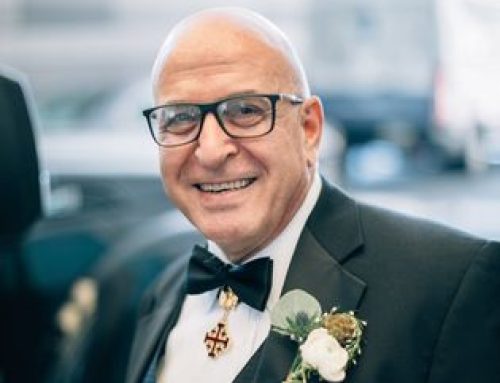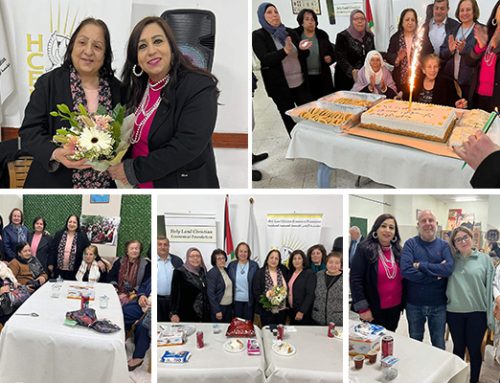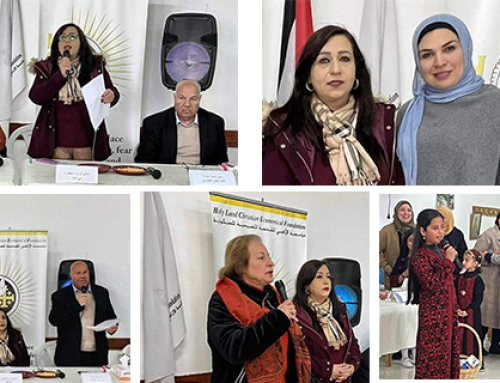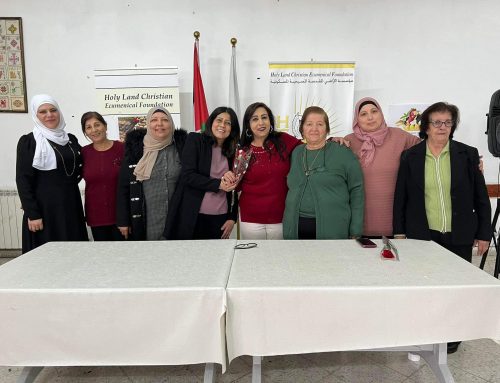
Solidarity Cross
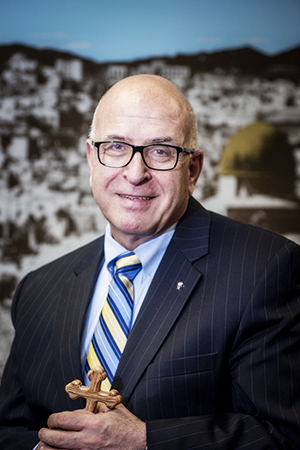 HCEF is working together with the Knights of Columbus to give hope to all Christians persecuted in the Middle East through the Solidarity Cross Program. The Knights of Columbus (K of C) is a fraternal benefit society founded in 1882 whose founding principles are charity, unity and fraternity. Now with more than 1.9 million members around the world, these core principles are what help establish the Solidarity Cross Program. In the Fall of 2015, the Knights of Columbus’ ‘Supreme Council’ wanted to help further the awareness of Christians being persecuted in the Middle East and offer relief by raising funds through the sales of olivewood crosses. To date, more than 110,000 crosses have been sold, aiding hundreds of thousands of dollars in relief money for the Middle East Christian refugees.
HCEF is working together with the Knights of Columbus to give hope to all Christians persecuted in the Middle East through the Solidarity Cross Program. The Knights of Columbus (K of C) is a fraternal benefit society founded in 1882 whose founding principles are charity, unity and fraternity. Now with more than 1.9 million members around the world, these core principles are what help establish the Solidarity Cross Program. In the Fall of 2015, the Knights of Columbus’ ‘Supreme Council’ wanted to help further the awareness of Christians being persecuted in the Middle East and offer relief by raising funds through the sales of olivewood crosses. To date, more than 110,000 crosses have been sold, aiding hundreds of thousands of dollars in relief money for the Middle East Christian refugees.Sir Rateb Rabie, CEO and President of HCEF, has been featured in an article of Columbia Magazine’s April 2016 issue highlighting his contributions to this vital partnership with the Knights of Columbus, providing relief to Christians throughout the region, including Syria and Iraq. HCEF has utilized their connections with the Palestinian Christian Artisans in the Bethlehem Area to create the Solidarity Crosses using the tradition of hand-carving olivewood.
Hope Carved in Olivewood
Order expands relief efforts to persecuted
Christians in the Middle East through the
Solidarity Cross Program
by Joseph O’Brien
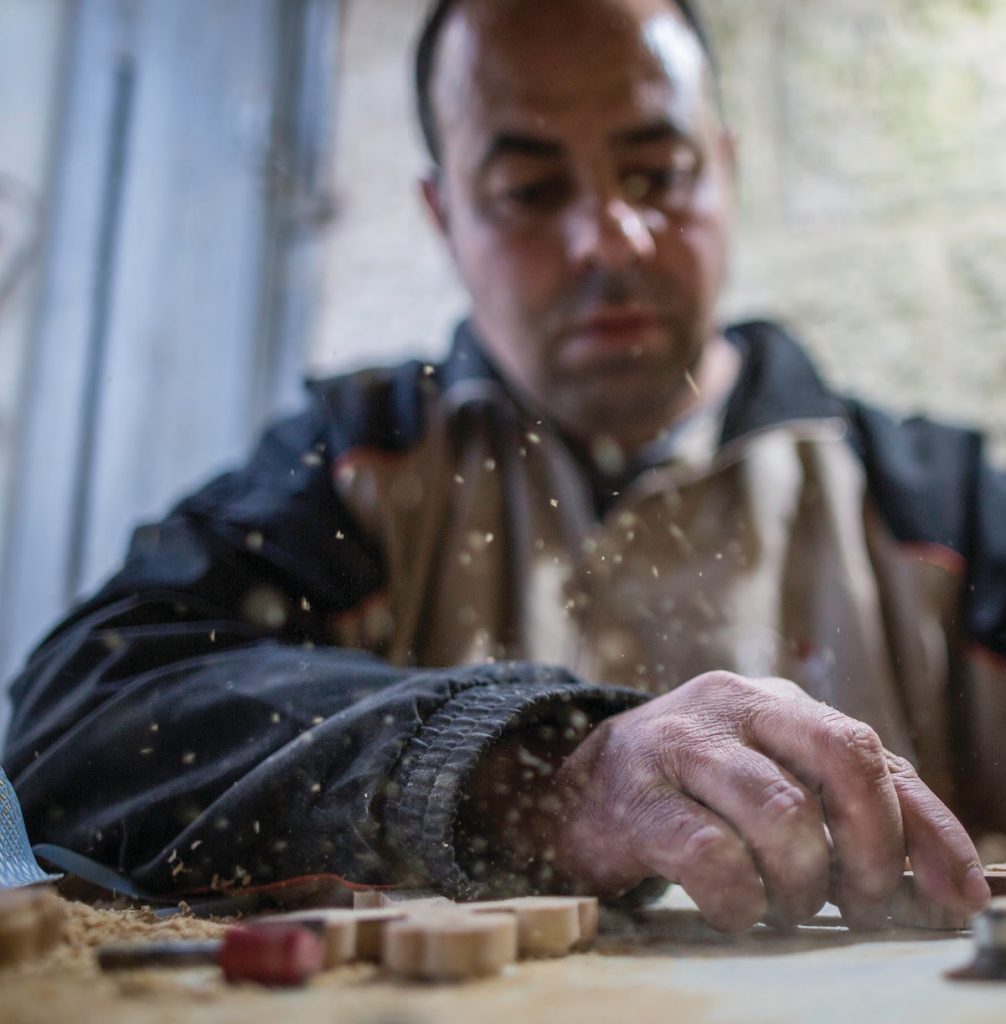
Last August, during his annual report at the Supreme Con- vention in Philadelphia, Supreme Knight Carl A.Anderson invited delegates to stand with him in solidarity for persecuted Christians in the Middle East, raising olivewood crosses and reciting together a prayer for those suffering.
In the fall, the Supreme Council initiated the Solidarity Cross Program to help raise further awareness and funds for Christians fleeing persecution and violence in the region. The program invites K of C units to purchase 5-inch olivewood
SOLIDARITY & SUPPORT
When Mexico South State Deputy José Antonio Fernández learned of the Solidarity Cross Program, he immediately recognized a bond between his own people and Christians in the Middle East.
“In Mexico, we suffered religious persecution at the beginning of the 20th century,” Fernández said. “We received sup- port from the Catholics in the United States and other parts of the world, and so now we want to show the same support for other persecuted people in the world.”
Communities throughout Fernández’s jurisdiction became involved, including his own Guadalupe Council 1050 in Mexico City, the oldest council in Mexico. To date, Knights in the area have distributed approximately 500 crosses.
“There has been a good response,” Fernández said. “People may not have much money, but they buy them because they want to help however they can.”
Msgr. Bornemann Council 16066 in West Reading, Pa., received an overwhelming response to the Solidarity Cross Program, according to Grand Knight Gerald Blaum.
“We had no idea up front how this program was going to go,” Blaum admitted. “So last December we ordered 100 crosses, and Father Keith Mathur blessed them at Friday morning Mass. There were maybe 25 people in the chapel, but we sold 33 of the crosses right after Mass. I thought, ‘Uh oh, we don’t have nearly enough number of crosses to meet demand!'”After the Knights in West Reading sold the remaining 67 that Sunday, they quickly ordered another 300.
“But even then, the following weekend there weren’t enough, and so I ordered again,” Blaum said. “In total we have sold 470 crosses.”
Christians in the wider Reading community also joined the effort, noted council member Robert Santoro.
“A Lutheran friend asked me to get him two crosses,andlater asked me to increase his order to five,”Santoro explained. “He also asked if one of our parish priests wouldbless them before giving them back to him. He wanted togive his family these crosses as presents on Christmas Day.”Salvatore Ficaccio, district deputy of District #26 in Alberta, encountered similar success when he introduced theSolidarity Cross Program to his district. Three councils immediately took up the challenge – Our Lady of GraceCouncil 12419 and Monsignor John Smith Council 9658, both in Calgary, and Ficaccio’s own St. Gabriel the Archangel Council 14492 in Chestermere, Alberta – and together sold some 400 crosses.
“Many Latino and Filipino parishioners were inspired to express their solidarity with the suffering people of the Middle East,” Ficaccio said. “They were very receptive to the crosses because of their own immigrant experiences.”
PALESTINIAN PARTNERSHIP
Not only are the crosses helping to bring relief in the form of housing, food and medical supplies to refugees, but the program is also helping nearly 200 Christian families in the Bethlehem area maintain their livelihood and traditions.
In order to bring the crosses to North America, the Knights of Columbus has partnered with the Holy Land Christian Ecumenical Foundation. Father Emil Salayta, a priest in Jordan, and Rateb Y. Rabie, a Palestinian Christian in Washington, D.C., established HCEF in 1998 to help pre- serve a Christian presence in the Holy Land. Rabie, a former businessman, now serves as president of HCEF (hcef.org).
As a Fourth Degree Knight and member of Rock Creek Council 2797 in Bethesda, Md., Rabie welcomed the invitation to partner with Knights in North America.
“I saw how the Knights of Columbus protected the Catholic Church in America,” he said in an interview from Bethlehem. “I felt that this is something I could do now to help defend the Mother Church here in the Holy Land.”
Before the present decades-long conflict between Muslims and Jews in the Holy Land began, more than 20 percent of the population was Christian, Rabie explained. Today, some 200,000 Palestinian Christians remain in the Holy Land – a mere 1.5 percent.
“How would you feel if you went to St. Peter’s Square in Rome and found no one there?” Rabie asked. “That is how we feel about Christians here in the Holy Land. We want to remain here.”
The ongoing strife has also reduced the stream of religious pilgrims and tourists who used to provide a livelihood for local Christian artisans in the region to a trickle. It makes sense, Rabie continued, that artisans today are putting their talents to work making crosses, the universal symbol of Christianity.
“We are protecting Christianity here, and just as Jesus carried his cross, we all carry a cross. It is our symbol of solidarity.” A Christian presence in the Holy Land, Rabie added, also serves as a peaceful witness to Muslims and Jews living there.”We feel that because we are Palestinians, we are the same as the Palestinian Muslims in everything but the faith,”he said. “With the Jews we have the Bible in common, and so we feel we are a bridge for peace and can understand both sides.”
A FAMILY TRADITION
Overall, 52 workshops have put 192 artisans to work, producing more than 81,000 olive wood crosses for the Solidarity Cross Program.
Having produced 11,200 Solidarity Crosses with two other artisans in his shop, Nicola Sansour of Bethlehem has been better able to support his family with the additional income, and with his wife and three children, he can continue the family craft first started by Sansour’s grandfather in the 1920s.
“I inherited my skills from my father and grandfather,” Sansour said. “My older son and daughter, who are 4 and 5 years old, are always helping me, sometimes carrying the crosses and the other things for me. They like to learn more and more and feel they can relate to me through the olive- woodcraft.”
When the HCEF offered to help Sansour find work after the recent violence evaporated Bethlehem’s tourism trade, the Sansours found a new source of income and a new reason to hope that the olive wood trade will prosper.
“It was really a wonderful feeling to have someone offer you work,” Sansour said, “after you have been sitting at home with no work for a long time.”
According to Sansour, the crosses are also an opportunity to supplement his meager salary as a Catholic high school religion teacher and to spread the Catholic faith beyond the classroom to the world.
He sets about his craft with the same patience, diligence and joy that has defined the family tradition for almost a century.
“When we join the two wooden pieces of the cross together, we then polish it to make it shine in the hands of all those who will hold it,” Sansour said. “I’m happy send it to my brothers and sisters in America so we can share the crosses together.”
With the Solidarity Crosses, he added, “I can translate charity into reality.”
For the full article as appears in the Magazine and on web, read here: https://bit.ly/23bdpEX
To learn more about the Knights of Columbus, please visit their website: www.kofc.org
JOSEPH O’BRIEN is a freelance writer who lives in Soldiers Grove,Wis.

